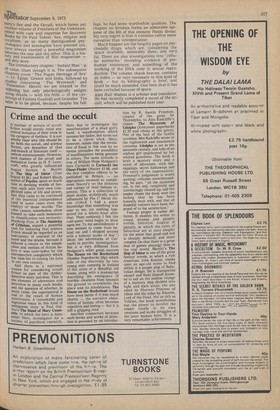Mysterious east
Alan Hull Watson
Vedanta for Modern Man edited by Christopher Isherwood (Mentor Books, New American Library 70p) Sex and the Ocuilt Gordon Wellesley (Souvenir Press 4.:2.601.
Vedanta for Modern 'Man is a rare garland of priceless jewels, gathered together in exposition and interpretation of Vedanta. And very welcome it is, considering the amount of half-baked rubbish now flooding the markets in the . name of occultism and religion. Vedanta, of course, is an age-old system of philosophy, developed by countless generations of sages who devoted their entire lives to the elucidation of the secret meaning of the Upanishads. The system is ascribed to Vyasa; and, Much later, was reformulated and popularised by Shankaracharya. Its origins are lost in remote antiquity. In comparatively recent years Aldous Huxley did much to bring it ,to the notice of the west, particularly in such works as his Perennial Philosophy.
Here, then, in a magnificently low-priced, voluminous, and beautifully printed paperback, we have a marvellous compendium of sixty-one esssays, quite a number being of
considerable length. With Isherwood and Prabhavananda as editors nobody need doubt the quality of the contributions, the scholar' ship, the insights, or thc lucidity of the prose — which, throughout, is excellent. In fact it might be said that anyone coming to this subject for the first time would experience no difficulty whatever in gaining a reliable an' cierstanding of its implications. This mg sound like high-flown praise. I can assure the reader that it is merely a simple and just esti' mate.
The contributors include Isherwood him; self, Prabhavananda, Huxley (with several valuable pieces), and Gerald Heard (whose Preface to Prayer is much in need of a re. print); also that great expert on Zen, Ala" Watts. The articles, covering every aspect ol Vedanta, have such titles as: Is Vedanta for the West?' 'Religion without Prayers'; flections on Progress', 'What is Religion. 'The Secret of Productive Work '; ' WorshiP and Meditation '; 'Some Reflections "r1 Time '; The Way to Liberation '; 'God IS Shy '; 'A Hindu View of Christian TheologY 'Religion and the World Crisis '; and Is OW Age Worth While?'
As the editor says in his Introduction, this is decidedly not a monotonous text-book. one can open it anywhere and commence reading, not only with interest, but with profit. More' over it is about a new religion — Vedanta presented for the West. For what is ancient for the east is new for us`over here. Unforto. nately, despite the missionary efforts of the Emperor Ashoka, and the tiny trickle of In' dian thought which reached us centuries ag" through Alexandria, Hindu ideas were ever like the proverbial water on the duck's bad; Christianity was torn from its original groan" 'by Islam, and then made to specialise in the western legalistic form of Catholicism. Otherwise it might have exchanged many valuable conceptions and ideas with the East — to the profit of both. Thus, as Gerald Heard puts it: "The width, and subtlety of Indian thought, the range its cosmology, the depth of its psychology. never succeeded in enlarging that narrose Hebrew scheme of things that has ever since cramped and hobbled the religion of the West." The same contributor also adds that "today the world is in touch with every Pall of itself as never before. We know that in spite of the exclusiveness of certain theologians, religions themselves are stronglY inclined . . to borrow from one another. Thus, "there is no doubt that we must look, forward to, and should anticipate a new syncretism of the religions of the world." As for myself, I must admit the study of Vedanta has helped me inestimably in the interpretation of Christianity. It has throw" new light, cast out doubts, and has trans' formed 'belief' into 'knowing.' Therefore, in an age when so many reviewers are inclined to cavil at what comes before their notice, I cannot do anything other than say: "Go and buy this Mentor. Its lucid style, its approach. its information and advice, imbue it with value for every man and woman, as well as for the specialist reader." And at seventy nevi pence it's an incredible bargain!
My second book this time is Gordon Well'
esley's Sex and the Occult, which forms yet another volume of Frontiers of the Unknown, edited with care and expertise for Souvenir Books by Dr Paul Tabor'. Sex, religion and occultism, as so many distinguished psychologists and sexologists have pointed out, have always exerted a powerful magnetism between the one and the other. This is a histnrY and examination of that magnetism — and ably done.
The inteoductory chapter, ' Instant Man ', is
of value, short though it is. The subsequent Chapters cover 'The Pagan Heritage of Sex' — i.e. Egypt, Greece and India, followed by studies concerning ' The Werewolf,' and 'Possession,' Herein we are treated to the
titillating but only psychologically enlight
ening details — with the frills — of the cavortings of Fathers Gaufridi and Grandier. The
latter is to be pitied, because, despite his fail ings, he had some worthwhile qualities. The chapter on Krishna forms an admirable epitome of the life of this eminent Hindu divine. My only regret is that it contains rather more narrative than interpretation.
Much happier are the lengthy pages on psychedelic drugs; which are, considering the space available, admirably done, and very ful. There are also investigations into cellular memories,' revealing evidence of prehuman existences; and something Of the working of the DNA code in sexual reproduction. The volume, thank heaven, contains an index — so very necessary in this kind of book — but its bibliography is brief, and could be much extended. One feels that it has been curtailed because of space.
Alan Hull Walton is a scholar and translator. He has recently completed a novel of the °Coin, which -will be published next year.



































 Previous page
Previous page